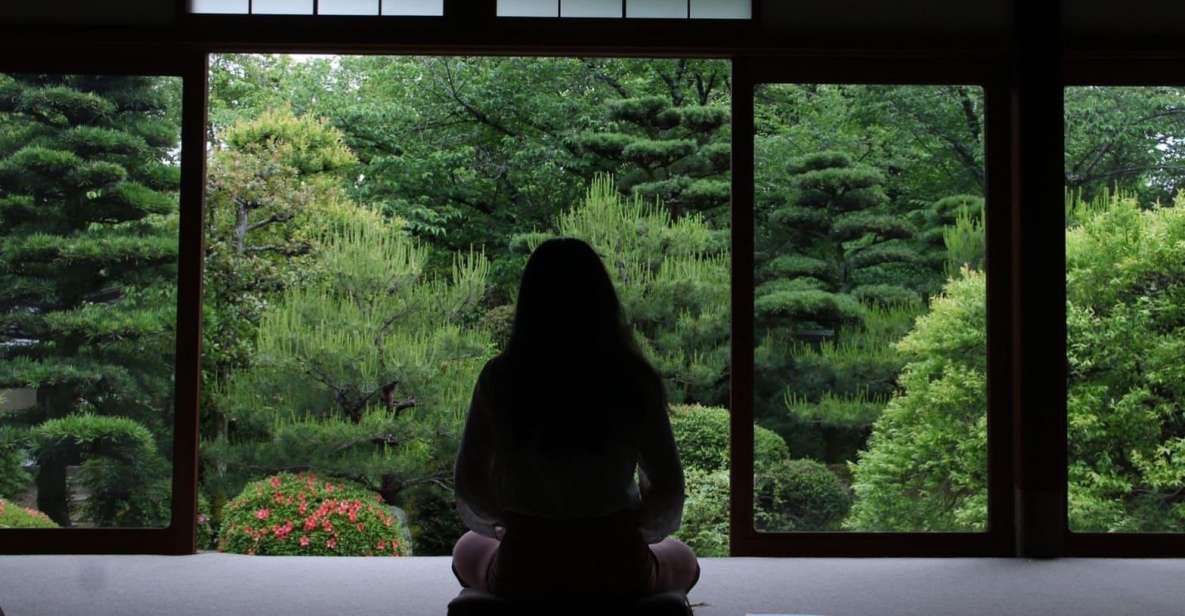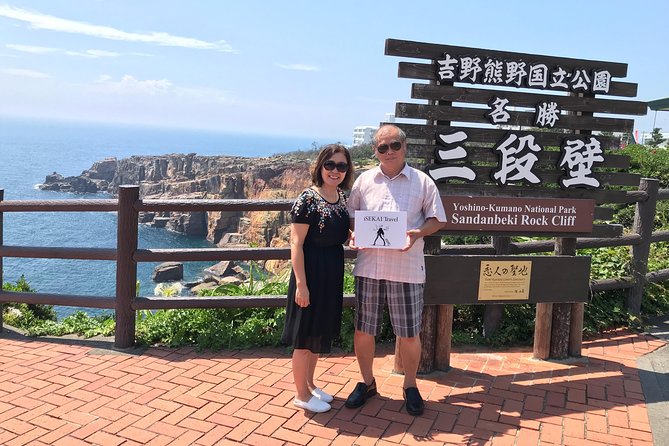In Kyoto, visitors can embark on a transformative journey through a Zen experience at the hidden Jushoin temple. Led by Chief Priest Nishida, guests uncover the secrets of Zen philosophy and enjoy its practices.
The experience includes a traditional tea ceremony, exploring the deep connection between Zen and tea. Within the temple grounds, a 400-year-old Japanese garden designed by Eitoku Kano awaits, preserving the ancient tranquility that has captivated visitors for centuries.
The Zen experience at Jushoin temple offers a unique insight into the world of Zen and its impact on Japanese culture.
Quick Takeaways

- Experience a tranquil temple atmosphere ideal for focused zazen meditation
- Uncover the secrets of Zen philosophy guided by the chief priest at Jushoin
- Enjoy the spiritual practices of Zen in the company of monks
- Engage in a tea ceremony to find the deep connection between Zen and tea
Not for you? Here's a few more great tours and experiences nearby.
Starting Location and Arrival

The journey to the Zen experience at Jushō-in Temple in Kyoto begins at 北総門, where visitors will arrive back at the same location.
Exploring the temple grounds is an essential part of this transformative experience.
To reach the temple, visitors have several transportation options. They can take a bus or a train to Myoshinji Station and then walk for about 10 minutes to reach the temple. Alternatively, they can take a taxi directly to the temple grounds.
Once at Jushō-in Temple, visitors can enjoy the serene atmosphere and engage in various activities such as zazen meditation and a tea ceremony.
The temple grounds offer a tranquil setting where visitors can connect with their inner selves and experience the profound philosophy of Zen.
You can also read our reviews of more tours and experiences in kyoto.
Jushō-in Temple

Located within the Myoshinji complex, Jushō-in Temple offers a tranquil setting for visitors to enjoy the practice of Zen meditation and engage in a tea ceremony.
This hidden temple experience provides a unique opportunity to explore Zen philosophy and explore its teachings. Guided by the chief priest at Jushō-in, visitors can uncover the secrets of Zen philosophy and gain a deeper understanding of its principles.
The temple provides a serene sanctuary where one can fully enjoy the spiritual practices of Zen, surrounded by the company of monks.
Along With the meditation practice, visitors can also participate in a tea ceremony, discovering the deep connection between Zen and tea.
This experience allows for a profound journey of self-discovery and contemplation in the heart of Kyoto.
Class (2 Hours)

During the 2-hour class at Jushō-in Temple, participants engage in various activities that explore the principles of Zen philosophy and meditation.
The class offers a unique opportunity to experience a tranquil temple atmosphere ideal for focused Zen meditation. Under the guidance of the chief priest at Jushoin, participants have the chance to uncover the secrets of Zen philosophy and enjoy the spiritual practices of Zen.
The class also includes a tea ceremony, where participants can explore the deep connection between Zen and tea. By practicing Zen meditation and engaging in the tea ceremony, participants can deepen their understanding of Zen philosophy and cultivate a sense of inner peace and mindfulness.
Experience Tranquil Temple Atmosphere
.jpg)
Visitors can enjoy a serene and peaceful temple atmosphere at Jushō-in Temple in Kyoto, where they can experience the tranquil ambiance and engage in various spiritual practices.
This hidden temple provides an ideal setting for focused Zazen meditation, allowing individuals to connect with their inner selves and find inner peace. Guided by the chief priest, visitors can uncover the secrets of Zen philosophy and gain a unique insight into its teachings.
Jushō-in Temple offers a sanctuary away from the bustling city, where one can escape the noise and distractions of everyday life. Enjoy the spiritual practices of Zen, surrounded by the company of monks who embody the teachings of Zen philosophy.
This peaceful retreat also offers the opportunity to participate in a traditional tea ceremony, where the deep connection between Zen and tea can be discovered.
Uncover Secrets of Zen Philosophy
.jpg)
The chief priest at Jushō-in Temple guides visitors in uncovering the secrets of Zen philosophy through immersive experiences and teachings. Through their guidance, visitors can gain a deep understanding of Zen philosophy and its practical applications in everyday life.
Here are two key aspects that visitors can explore:
- Zen philosophy and its practical applications:
- Learn about the principles of Zen philosophy, such as mindfulness, presence, and non-attachment.
- Discover how these principles can be applied to various aspects of life, including work, relationships, and personal growth.
- The connection between Zen and tea culture:
- Explore the deep connection between Zen philosophy and the traditional tea ceremony.
- Understand how the rituals and mindfulness practiced in the tea ceremony align with Zen principles, fostering a sense of calm, focus, and appreciation for the present moment.
Immerse in Spiritual Practices of Zen
.jpg)
To fully immerse in the spiritual practices of Zen, participants at Jushō-in Temple engage in various activities that cultivate mindfulness and deepen their understanding of Zen philosophy.
One of the central practices is Zen meditation, also known as zazen. This form of seated meditation is characterized by focusing on the breath and observing thoughts without judgment. Through regular meditation sessions, participants learn to quiet their minds, develop inner stillness, and cultivate a sense of presence.
Another important aspect of the spiritual practices at Jushō-in Temple is the connection between Zen and tea. Participants engage in a traditional tea ceremony, where they’re guided in preparing and savoring matcha, a powdered green tea. This ritual serves as a way to cultivate mindfulness, attention to detail, and appreciation for the present moment.
Engage in Tea Ceremony
.jpg)
Participants at Jushō-in Temple engage in a captivating tea ceremony, seeing the serene ambiance and savoring the profound connection between Zen philosophy and the art of tea. This ancient practice holds great cultural significance and is deeply rooted in the principles of Zen and mindfulness.
Here are some key aspects of the tea ceremony at Jushō-in Temple:
-
Ritualistic Preparation:
Participants witness the meticulous preparation of matcha, a powdered green tea, by the tea master. Every movement, from the placement of the tea utensils to the pouring of hot water, is deliberate and precise. -
Mindful Consumption:
The act of drinking tea becomes a meditative experience, as participants focus on the aroma, taste, and texture of the tea. By being fully present in the moment, they cultivate a sense of mindfulness and deepen their connection to the present.
The tea ceremony not only offers a momentary escape from the hustle and bustle of everyday life but also serves as a reminder of the importance of simplicity, harmony, and tranquility in our fast-paced world.
Drink Matcha and Eat Sweets in Historic Garden
.jpg)
In this serene setting, visitors can indulge in the exquisite pleasure of sipping matcha and savoring traditional sweets amidst the historic beauty of the 400-year-old Japanese garden.
The experience of drinking matcha, a finely powdered green tea, is an integral part of Japanese tea ceremony etiquette. Matcha has a rich history that dates back centuries, originating in China before being adopted and refined by Japanese tea masters. The preparation and presentation of matcha are steeped in tradition and precision, with each step carefully executed to ensure the perfect cup of tea.
As visitors enjoy their matcha, they can also savor traditional sweets that complement the flavors of the tea. These sweets, known as wagashi, are meticulously crafted to harmonize with the bitterness of matcha, creating a balanced and delightful tasting experience.
The combination of matcha, sweets, and the serene setting of the historic garden creates a truly memorable and immersive experience for visitors.
Frequently Asked Questions
.jpg)
How Do I Book a Zen Experience at the Jushoin Temple in Kyoto?
To book a Zen experience at Jushoin Temple in Kyoto, visit their website or contact them directly. Availability, pricing, and reservation requirements can be found on their site.
Can I Visit the Jushoin Temple Without Participating in the Zen Experience?
Visitors can explore the surroundings of Jushoin Temple without participating in the zen experience. They can appreciate the 400-year-old Japanese garden and enjoy the tranquility of the temple.
Are There Any Age Restrictions for Participating in the Zen Experience at the Jushoin Temple?
There are no age restrictions for participating in the Zen experience at the Jushoin Temple. People of all ages can engage in the tranquil temple atmosphere and uncover the secrets of Zen philosophy.
Is Photography Allowed During the Zen Experience and Tea Ceremony at the Jushoin Temple?
Photography is restricted during the Zen experience and tea ceremony at the Jushoin temple in Kyoto. Visitors are encouraged to fully enjoy the spiritual practices and peaceful atmosphere without the distraction of taking pictures.
Are There Any Specific Dress Code Requirements for the Zen Experience at the Jushoin Temple?
There are specific dress code requirements for the Zen experience at the Jushoin temple. Visitors are expected to dress modestly and remove their shoes before entering. Etiquette guidelines should be followed to maintain a respectful atmosphere.
The Sum Up
Embarking on a Zen experience at the hidden Jushoin temple in Kyoto is a transformative journey that offers a unique insight into the world of Zen and its profound impact on Japanese culture.
Led by Chief Priest Nishida, guests can uncover the secrets of Zen philosophy and enjoy its spiritual practices.
With a traditional tea ceremony and a 400-year-old Japanese garden, this serene sanctuary provides the perfect atmosphere for inner peace and cultural enlightenment.
Don’t miss the chance to experience this captivating blend of tranquility and tradition.
More Tour Reviews in kyoto
Not for you? Here's more nearby things to do in kyoto we have reviewed
- Private Airport Transfer Kansai Airport in Kyoto Using Hiace
- Samurai Experience & Kenbu Show in Kyoto
- Perfect 4 Day Sightseeing in Japan
- Osaka Kansai Airport (KIX) to Kyoto – Arrival Private Transfer
- Online Japanese Tea Meditation
- Our Family-Only Trip (Osaka, Kyoto, Nara, Kobe) / Free of Charge
- Samurai Sword Experience in Kyoto (Family & Kid Friendly)
- Mt Koya 2-Day Private Walking Tour From Kyoto
- Private Kyoto Geisha Districts Walking Tour
- Simple Kimono Plan&Gorgeous Kimono Experience
- Private Customized 3 Full Days Tour Package: Discover Kyoto, Arashiyama and Nara
- Private Sedan Hire in Osaka Kyoto Nara Kobe With English Speaking Driver



